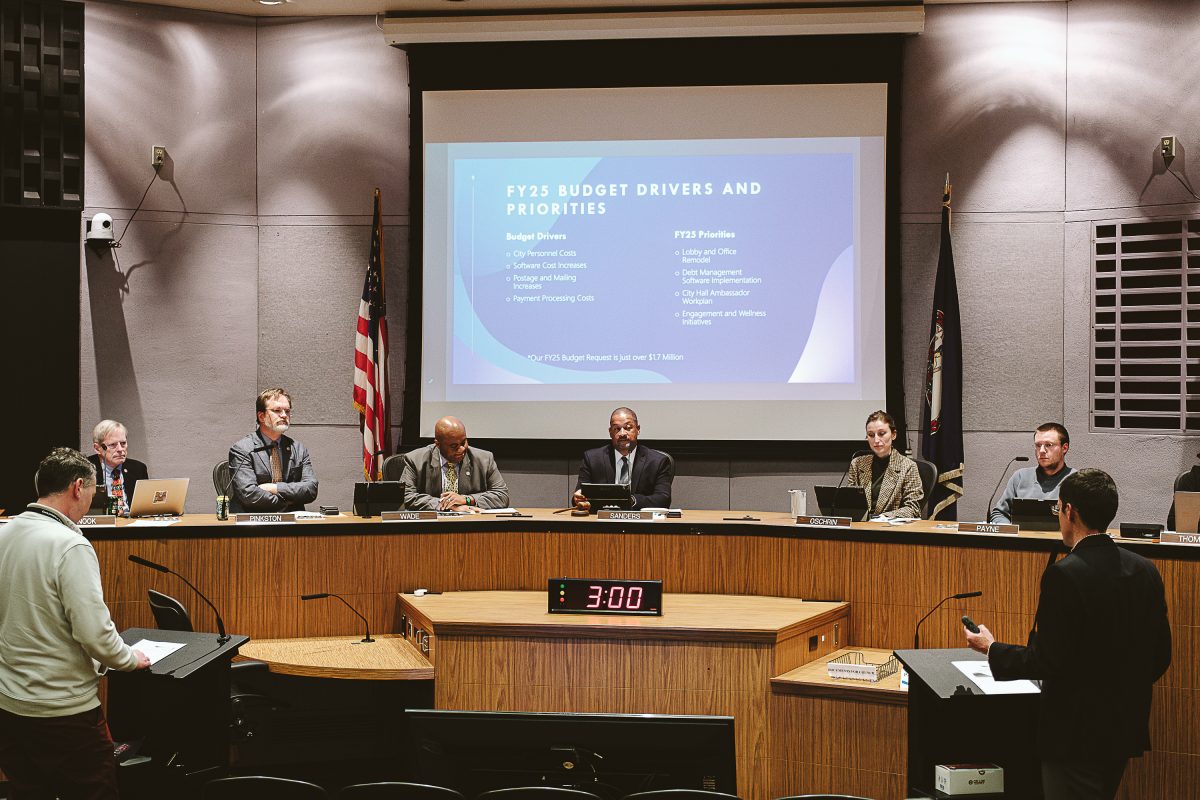Charlottesville City Manager Sam Sanders presented the proposed budget to City Council on March 6, prompting discussion and debate on funding allocations and potential tax hikes.
Coming in at 350 pages and $251,526,900 in total revenues and expenditures, Charlottesville’s budget for FY25 is hefty in several ways. However, nothing is final yet. Councilors have until the city’s April 9 deadline—with a hard statewide deadline of April 15—to examine the budget, hear from constituents, and consider potential amendments.
“The city manager had to prepare a budget that balances,” says Councilor Lloyd Snook. “We will take his recommended budget and hear his justifications and make a decision by April 9.”
Highlights from the presentation included $10 million for the integration of collective bargaining, $7 million in additional funding for Charlottesville City Schools, and $8.9 million for affordable housing.
In order to fund these initiatives and other priorities, the budget would increase the city’s meals, lodging, and real estate taxes. The meals tax would be raised to 7.5 percent, lodging to 9 percent, and real estate to 98 cents per $100.
If approved, this will mark the third time Charlottesville has raised its meals tax in the last five years (it is currently 6.5 percent).
“None of the tax levers we have are without issue,” says Councilor Brian Pinkston. “Each impacts the community in particular ways. We’re trying to be sensitive to that fact.”
Though he supports many of the projects funded through increased revenue from the suggested tax increases, Councilor Michael Payne was more hesitant about raising the meals tax.
“Personally, I think the meals tax should be the last tax we seek to raise. It’s our most regressive tax, and after raising it again we’d be near the top of the state for our meals tax rate,” says Payne. “Local restaurants operate on small margins and unlike with our real estate tax, there is no tax relief program for the meals tax.”
Meals taxes stack on top of state and local sales tax, meaning area diners could see a 12.8 percent tax on their food and drink purchases if the hike is approved.
For comparison, a 7.5 percent meals tax would put Charlottesville at parity with Richmond, and just below the highest meals tax in the state—8 percent in Covington, Virginia.
Alternatives to raising the meals tax include raising the lodging and real estate taxes further, according to Payne. Otherwise, major cuts would need to be made, leaving several city priorities unfunded or underfunded.
“The primary driver of the need for new revenues is employee compensation and increased contribution to schools. … These aren’t one-time expenses, they’re permanent and become a new baseline for the city budget,” says Payne. “If these aren’t fund[ed] via tax increases, about $17 million of cuts would need to be identified in the general fund.”
A sharp drop in funding from the state government prompted CCS to request a higher appropriation from the city. The city’s appropriation is $2 million short of the school district’s requested appropriation, raising concerns among education leaders.
“The discrepancy directly affects the daily experiences of both students and teachers. Our budget outlines positions aimed at reducing class sizes and providing interventionists to address gaps in student achievement,” says CCS School Board Chair Lisa Larson-Torres. “We have been working very closely with the city team, and they have been very transparent about the current state of their budget. Nevertheless, we felt that it was still important to present our budget with the $9 million dollar increase as it meets the essential needs of our students.”
Some city councilors are hopeful that additional state funding may be coming, helping the school district fill any budget gaps.
“Part of the reason that we are in this problem right now with school funding is that the state funding for our schools got cut by $2.9 million compared to last year,” says Snook. “We—and the school system—have been scrambling ever since getting that news.”
“It’s a challenging time because their needs overlap with this necessary investment in the city organization,” says Pinkston. “I am hopeful that there will be some additional relief from the state.”
Charlottesville leadership has a jam-packed schedule during budget deliberations over the next month, with at least one meeting every week. Public hearings on the proposed budget will be held on March 18 and 21, with the first session focused on tax rates.
At press time, Councilor Natalie Oschrin, Mayor Juandiego Wade, and Sanders had not responded to a request for comment.










